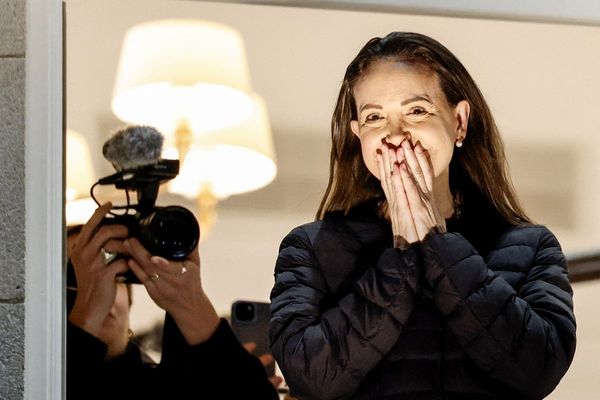
Handing out Brothers of Italy leaflets on one of Sesto San Giovanni’s main thoroughfares, Michele Russo is on ebullient form. An activist on the Italian far right since the early 1990s, and a member of Giorgia Meloni’s party since its inception in 2012, Russo never expected to witness an election like this.
“We started at 1.9% of the vote back then!” he says. “I thought there was no way we ever get more than 10%. Now we’re approaching 30%.” As someone shouts an insult from a passing car, there is general laughter from the group of leafleters. “They don’t want to acknowledge that times have changed around here. They’re still in mourning!”
The northernmost stop on Milan’s M1 metro line, far from the Duomo and La Scala, Sesto San Giovanni used to be a no-go zone for the right. Nicknamed “Stalingrad”, its roads and civic buildings still testify to the lost era when the local Communist party ran the area, backed by huge workforces employed in four metalwork factories.
But a different political wind now blows past the Karl Marx municipal library. On Sunday, in one of the most closely watched races in the country’s general election, polls suggest Sesto is on the brink of voting for Isabella Rauti, the daughter of Pino Rauti, one of Italy’s most prominent 20th-century neo-fascists, and among the most senior figures in Meloni’s party. A precedent was set five years ago when Sesto elected its first rightwing mayor after decades of unbroken rule by the left. The stakes, given the town’s status as one of the key swing seats in the race for Italy’sSenate, could scarcely be higher.
Rauti’s background encapsulates progressive fears that Italy is about to hand power to influences kept at the margins for 70 years. Adding to the sense that this is no ordinary contest, her centre-left opponent in Sesto is Emanuele Fiano, whose father was a survivor of Auschwitz. Notwithstanding the urgency of the current economic crisis, the past has cast a dark shadow over the campaign.

“There’s a very simple way that Brothers of Italy could show they have broken with the past,” says Fiano. “They could remove the tricolour flame from their logo, which dates back to Mussolini’s supporters. But we are interested in contesting their ideas and values today.”
He cites the motion approved last week by the European parliament, which stated that under Viktor Orbán Hungary is no longer a full democracy and has become an electoral autocracy. “Meloni is a core supporter of a leader who invented the idea of ‘illiberal democracy’. She says if a leader wins through a vote, that’s democracy. Is Putin a democrat, then? We know that she wants to change the presidential system, but they won’t say how. I am not accusing Brothers of Italy, or Rauti, of being fascists, but history provides lessons.”
Rauti dismisses such talk as part of a “project fear” campaign by the left – one that is doomed to fail. “The left is apoplectic,” she says, “because it has understood that after a long period in which it has been in government, it is about to lose its hegemony. The Italian right has made a journey. We are a conservative party. What’s fascinating about Sesto is that the shifting politics here have anticipated what’s happening in the rest of Italy. The old-style worker is voting for Meloni and the right.”

In Viale Casiraghi in Sesto, where Russo’s group of activists had gathered earlier, the views of Cosimo Apicella, 77, appear to bear out that thesis. Apicella used to work as a mechanic at the giant Falck steelworks that once dominated Sesto’s skyline. In the 1990s, as local industry shut down, he voted hard left. On Sunday, he will vote for the rightwing coalition represented by Rauti. “The left has stopped representing the workers,” said Apicella. “Before, there used to be two Milans, the Catholic one of the bosses and the middle classes, and the leftwing one of the workers. The second world has disintegrated. Politicians on the left allowed globalisation to destroy it. Make sure you put that in your paper.”
More significantly for the future perhaps, the sense of post-industrial disillusionment in places like this has carried through to the next generations. According to Roberto Camagni, professor of urban economics at the Politecnico di Milano: “‘The workers’ – that old phrase – isn’t a relevant category any more in Sesto. The loss of the old blue-collar world in Sesto and elsewhere was a cultural loss as well. Old class solidarities disappeared, along with a certain sense of security.”
The new reality is more anxious and more fluid in its political affiliations. “The sons and daughters of many of those old workers are more insecure, often in precarious jobs,” says Camagni. “Or employed in call centres and in low-level white-collar jobs which are vulnerable to automation. The far right is profiting from a widespread sense of frustration, exploiting it to create a different, menacing kind of solidarity – one that unifies people against immigrants and other minorities.”
As in Orbán’s Hungary, gender theory has become a useful dividing line. During a campaign that has become ever more polarised, Rauti, who is the Brothers of Italy spokesperson for equal rights, made headlines by attacking a recently broadcast episode of Peppa Pig featuring a polar bear character with same-sex parents.
Since being elected in 2017, Sesto’s first rightwing mayor, Roberto di Stefano, has rigorously followed the playbook Camagni describes. A supporter of Matteo Salvini’s populist League party, Di Stefano orchestrated virulent opposition to plans for an adequate mosque for the city’s sizable Muslim population, who currently worship in an out-of-town prefab hut. Recently re-elected, during his first term in office he also launched a ‘clean up the streets’ campaign. More than 200 people were driven out of the town – most of them homeless, migrants or street vendors.
Samarkanda Abou El Kheir, a researcher for a popular television show, has lived in Sesto for most of her life. Half Italian and half Egyptian, she is watching Meloni’s rise, and Rauti’s campaign, with trepidation. “I’m frightened by the direction of travel,” she says. “In Sesto in recent times, and not just here, you can feel a changing atmosphere just going about everyday life. The anti-mosque campaign in particular has been so hurtful. I am an Italian citizen who has the freedom to adopt the faith I choose. Why should I have to pray in a kind of container?

“My mother is Italian. But because I wear a headscarf I am never treated as an Italian. The far right talks about the need for immigrants to integrate and then it does everything it can to make integration impossible.” When it comes to housing and jobs, she says, an “Italians first” approach is in full swing. “If you’re an immigrant, then the message is ‘one false move and you will be thrown out’. This is not just the case here in Sesto, although maybe the hostility of the politics is more open here. I’m sympathetic to ordinary people who are struggling with bills and economic difficulties and have few options. But politicians have to stop blaming years of economic policy failure on migrants, LGBT people and other minorities.”
According to one study, Sesto San Giovanni is one of 67 first-past-the-post seats where the outcome could go either way. These key battles will both determine whether Giorgia Meloni becomes Italy’s next prime minister, and whether she can win a two-thirds majority and with it the power to change Italy’s constitution. Implausible as it would have seemed even 10 years ago, “Stalingrad” could help deliver the most rightwing government in Italy’s postwar history. For those in the city who have stayed loyal to its political traditions, it is a hard prospect to contemplate.
“In the 1970s, Sesto was awarded the gold medal for military valour for its resistance to the Nazis,” says Abou El Kheir. “If Rauti wins here on Sunday, the daughter of a well-known fascist, it will be unbelievably painful.”







